Search by category, archive or keyword

There is an overwhelming amount of book choices about drug and alcohol addiction. A wise man once said that the only problem with self-help books is starting with the self.
The meaning behind this comment is people with alcohol and drug addiction, and their affected families are their own worst enemy. Their distorted perceptions and belief systems largely have them in their very predicament.
Substance users and their families may be the least qualified people to read a self-help book and then go and try and fix a problem themselves. The substance user and their family will most likely read the material through a distorted lens.
With that being said, many books are great reads, including Alcoholics Anonymous, which is not a self-help book but rather a textbook of insight and suggestion. None of the suggestions are to correct the problem without help and a solution from someone other than yourself.
Books on drug and alcohol addiction can motivate some. Others may believe the ideas and suggestions do not apply to them and discredit any insight or solutions.
Think about a person who reads the books Alcoholics or Narcotics Anonymous while in detox or actively using or drinking alcohol. Would the book read the same way as it was when the person is healthy and ten years clean and sober? As long as you go into the book looking for similarities rather than differences, you may find some books helpful.
Reading a book and taking no action will do nothing more than allow you to say you read the book. Books on drug and alcohol addiction do not make you better; you have to take action and find guidance from someone other than just yourself.
If you read the book of Alcoholics or Narcotics Anonymous and did nothing more than that, chances are you wouldn’t be any soberer than you are now; it is possible, yet highly unlikely. Knowledge may be power, but taking action is what brings change.
In this extensive blog, we will look at recommended books for the following:
- Drug and alcohol addiction
- Families of drug addicts
- Parents of addicts
- Families of alcoholics
- Explaining addiction to a child
Recommended Books on Drug and Alcohol Addiction
The most widely recognized book on which almost every drug and alcohol treatment center bases its curriculum is the book of Alcoholics Anonymous.
Whether you like Alcoholics Anonymous or not, the book has amazing insight. We believe every addict, alcoholic, and family should read it as they will find themselves in the text at some point.
The Book of Alcoholics Anonymous
The Book of Alcoholics Anonymous can be read and used as a guide to sobriety regardless of one’s substance of choice. The book sheds light on the behaviors, reasons, shortcomings, and character defects. It provides tremendous insight into the substance user’s struggle with resentment, selfishness, dishonesty, self-will, and perception.
Regardless of how one finds their way out of addiction, the chances are excellent that some of the successfully applied strategies run parallel an idea, thought, action, and structure to suggestions of Alcoholics Anonymous.
When you read any Masters or Ph.D. level textbooks on counseling theories and strategies, you find strategies utilized in Alcoholics Anonymous. Looking back to the psychoanalytic theory developed by Sigmund Freud and the collective unconscious developed by Carl Jung, there are similarities to the suggestions of Alcoholics Anonymous.
As you read through all the other counseling strategies that came after, you will find equal similarities. The point is the foundational message, vision, and solution of Alcoholics Anonymous cannot be completely avoided regardless of which method works for someone to achieve sobriety.
Any book that helps the substance user change their behavior and address their character defects and shortcomings while finding support from someone other than themselves has a better chance of finding sobriety than someone who corrects the problem through self-help books alone.
Trying to strategize and find solutions with other family members affected by the addiction is not always the best course of action either and often results in ineffective outcomes.
Recommended Books for Families of Drug Addicts
Family members of addicts are looking for insight and solutions. Learning about addiction can be very helpful, and it can help the reader look at things through a different lens.
As stated earlier, reading the book and doing nothing more would result in inaction. Family members of addicts develop an unhealthy dysfunctional family system. Unless the book helps the family members identify their role in the unbalanced family system, the book of choice may not be as helpful as one would hope for.
Regardless of the book you choose, it is always recommended that family members of addicts and alcoholics check out support groups such as Al-Anon, Families Anonymous, and ACOA meetings, along with individual therapy.
Here are some other books we believe will provide you with strong insight into addiction and the obstacles that both families and drug addicts face.
In the Realm of Hungry Ghosts
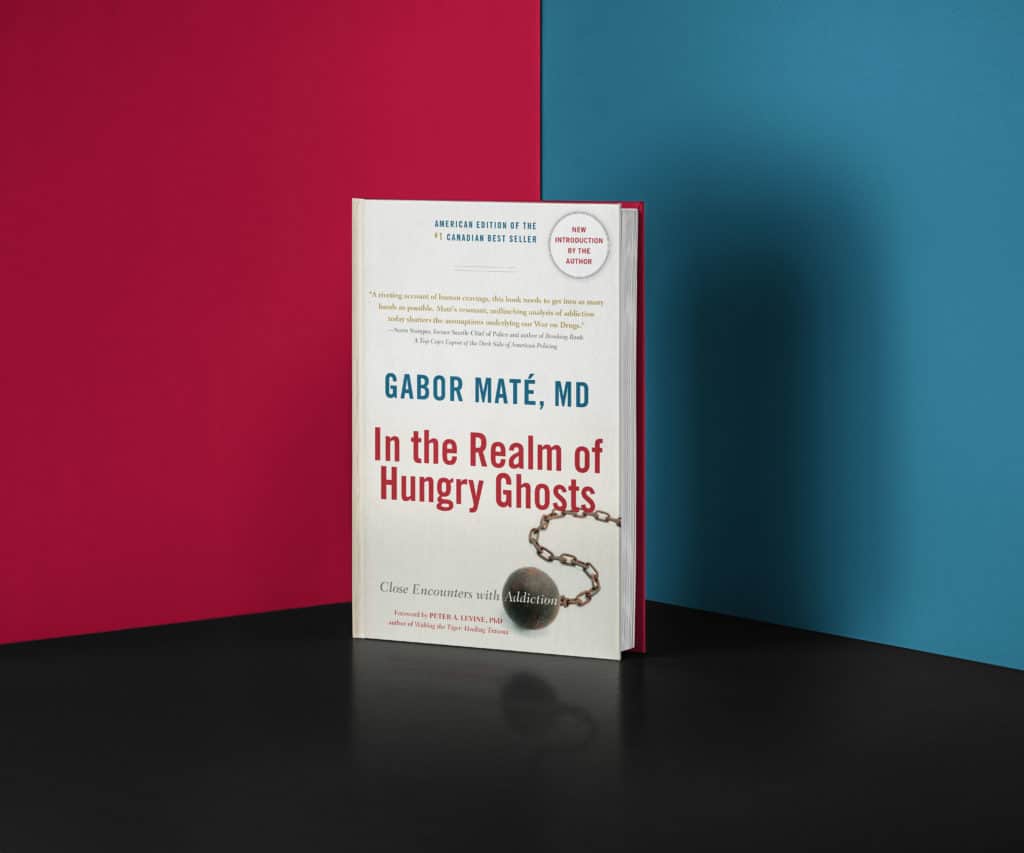
Dr. Gabor Mate provides strong insight into addiction and all the forces that drive it, along with suggested solutions. Whether you agree or disagree, anything you watch or read by Dr. Gabor Mate is worth it. If you search online, you will find many videos and material by Dr. Gabor Mate.
Of all his books, In The Realm of Hungry Ghosts is one of his best. Mate describes how he believes much of addiction in your adult years stems from childhood trauma. Mate believes some trauma can come from our implicit memory. Implicit memory is memory without recollection of the actual event. This can start as early as the stages of child development.
In our experience, much of what Dr. Mate says it’s spot on. Almost every substance user we have encountered has had some form of childhood trauma. This can range from emotional, sexual, and physical abuse to growing up in a one-parent home, being adopted, or not feeling your parents’ love, attention, or affection.
For some reading this, they may think, “That didn’t happen in our house.” Firstly, you don’t know for sure if something happened outside of the house and is a buried secret. Secondly, it is not about whether you know it happened or what you think happened; it is about how the other person feels when anything happens.
Everyone is different and is affected differently. Some children grow up in horrible situations and become very successful with no addiction issues. Some children grow up with a void or a hole because dad was never there, or if he was, he never gave them attention or said he was proud of them. Trauma can range through a vast range of scenarios, and it’s all in the perception of how the person sees it and how they were affected.
Pleasure Unwoven
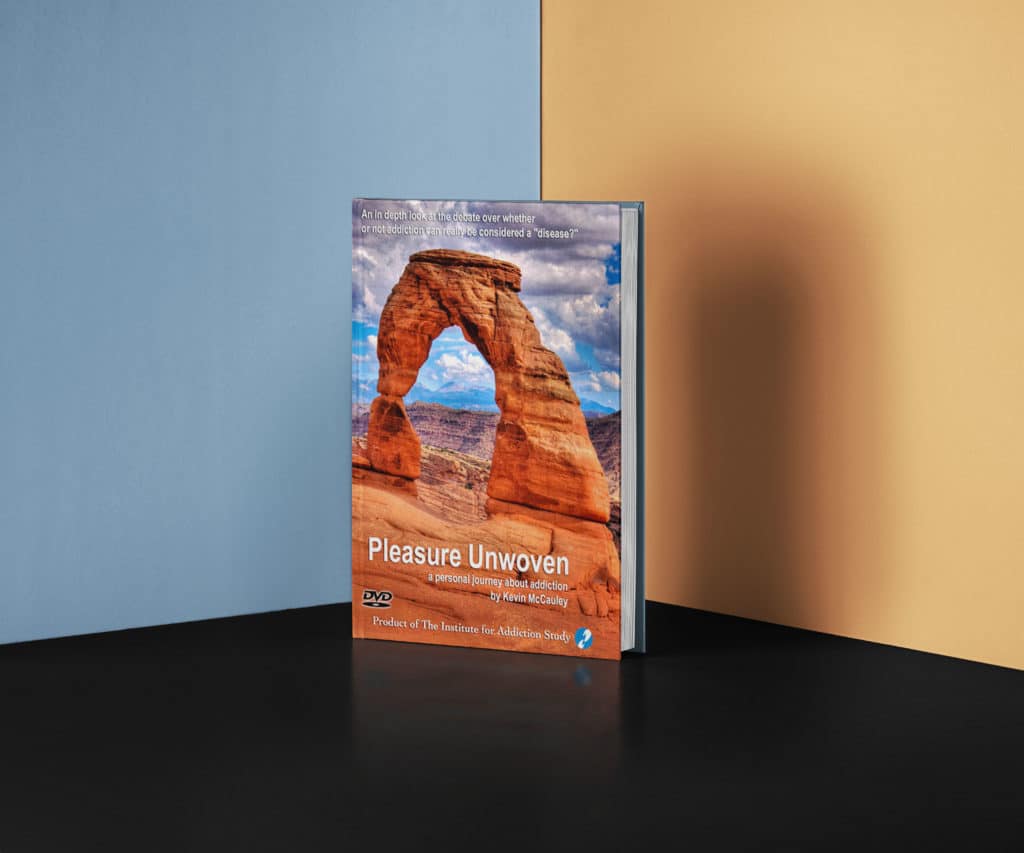
Pleasure Unwoven was written by Dr. Kevin McCauley and can also be viewed as a documentary. Reading and watching Pleasure Unwoven, along with material by Dr. Gabor Mate, can give you two different perspectives.
Dr. Mate does not appear to believe in the disease concept, and Pleasure Unwoven sets out to test whether or not it is. We won’t spoil the movie, and regardless of whether or not it is a disease, there are effective solutions to treating addiction.
Irrespective of where addiction comes from, the substance user has two options: They can either continue to destroy their lives and others’ lives or accept help and turn their lives around.
Another note to consider is families, friends, and some members of society often feel the substance user is a hopeless victim when they believe the disease model of addiction. Whether or not it is a disease, enabling, codependency, and playing out counterproductive family roles do not correct it.
There are many diseases globally, and they all have their suggested solutions. The disease may not be the fault of the diseased person, and the responsibility to address it falls in the hands of both the person with the disease and the family and friends that love them; the solutions come from professionals who are experts in the specific disease.
One of the problems we see with addiction is that some of the suggested solutions by way of consequences and accountability are different than almost every other disease. You would not treat other diseases the same way you treat a substance use disorder.
One of the many differences is that family and friends of loved ones suffering from other diseases do not have to set boundaries, consequences, and accountability for the patient to seek help. People with diseases other than addiction often fight for the cure and the solution. Substance users do the opposite; they manipulate and break people down as they battle to stay sick.
Beautiful Boy

Beautiful Boy is a good book and movie that does an excellent job of bringing the reader or viewer into the life of a substance user and the affected family.
One of the most profound parts of the movie is when Nic’s father, David, is packing a bag to rescue his son. When his wife Karen, Nic’s stepmom, asked David where he was going, he said he would make Nic better. Karen said in a stressed tone, “You can’t fix this.” Whether that happened in real life or not, it was a genuine truth. The book and movie sent a strong message that detachment from the addiction and not from the substance user can be effective.
Families often increase the addiction problem and may or may not believe the help they provide will one day pay off. Addiction does not improve by providing the affected person with resources, housing, food, comfort, and other forms of counterproductive support.
No substance user enters a rehab center or considers positive change unless they see and feel the need to do so. To this day, almost every addiction professional concedes to that; not all, and most do. When addicted lives are made easier, the addicted person is less likely to change their life.
Addict in the Family

Addict in the Family by Beverly Conyers is a book to help comfort family members by assisting them in understanding that they did not cause the addiction, nor could they have done anything to prevent it. Whether or not we fully agree with that concept, it still proves to be a great read. We encourage families of addicts to read it and compare it to other books that have different theories and beliefs.
The nice part about the book is it encourages detachment and helps families understand the need to take their lives back and enjoy it. Letting the addict take you down with them is not something this book suggests.
As we believe and as the book suggests, you may not have control over the addict directly, and you do have control over how you cope, react, and treat yourself concerning your loved one’s addiction. They may not get better, but you can.
Recommended Books for Parents of Addicts
Books that focus on enabling and codependency are often recommended for parents of addicts. Al-Anon support groups and individual and marriage counseling can help parents.
Addiction is often viewed differently and affects parents differently. One of the biggest challenges we face as addiction intervention professionals is the family. Parents and other family members are rarely on the same page.
Books that help families and parents understand family systems, codependency, enabling, boundaries, consequences, and accountability can help parents unite on a common strategy and solution.
Almost all of our inquiries that come into our office are from moms, sisters, aunts, wives, and grandmothers. Nearly every inquiry that is rejected and sabotaged from moving forward with an intervention is by the dad, brother, uncle, husband, and grandfather; in other words, shot down by the male.
We’re not here to debate which side is correct. We would like to see unification and understanding of how working together produce effective solutions for families and parents.
Two books that we believe every parent of an addict should read in addition to those listed above and below the book of Alcoholics Anonymous and Narcotics Anonymous. These two books are suggested reads for addicts and alcoholics. Both do an outstanding job of providing insight into the problems of behavior and perception for the addict and alcoholic. Whether the parents of an addict agree or disagree with the 12-step philosophy, we are pretty sure that there will be many eye-opening moments while reading either of these two books.
Boundaries by Henry Cloud and John Townsend
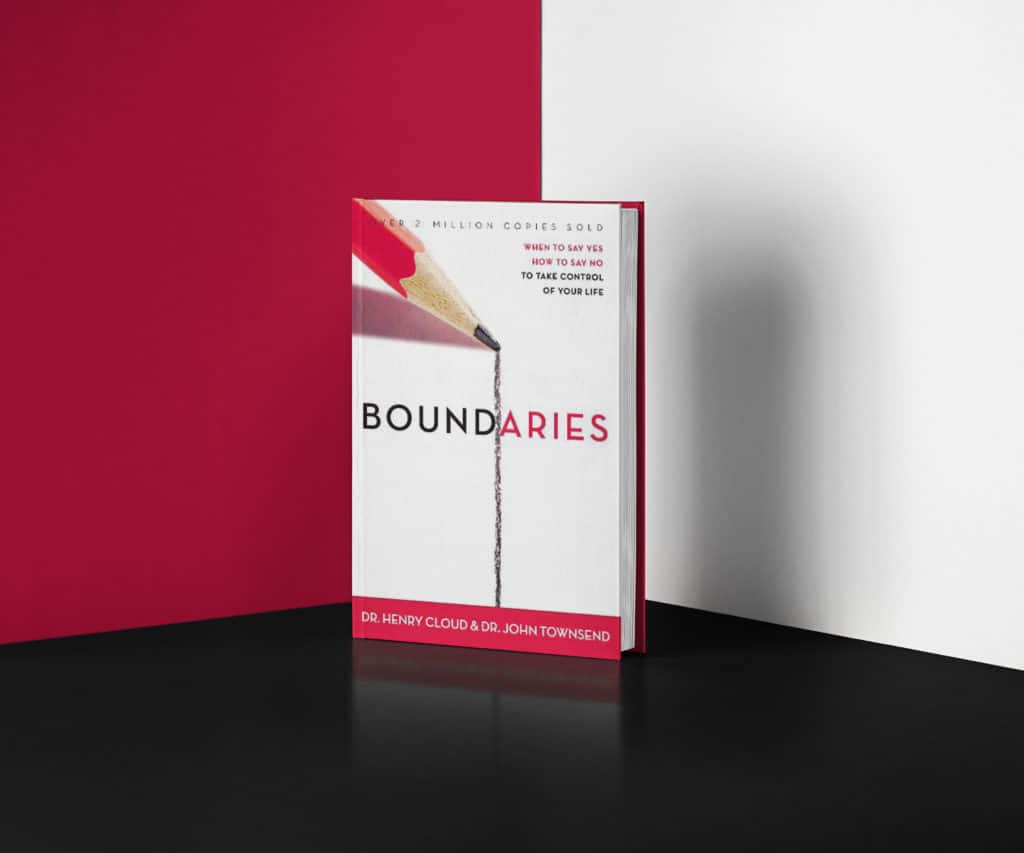
Boundaries by Henry Cloud and John Townsend are about taking control of your life, knowing when to say yes, and learning how to say no. An addict can penetrate the mental state of any family member and profoundly affect their ability to make effective decisions.
Henry Cloud and John Townsend do a great job of helping the reader regain control of their thoughts and opinions. Learning how to set healthy boundaries and relearning the word no can be very helpful for any family member of an addict or alcoholic. Whenever a toxic person, place, or thing enters your life, you have the choice and ability to reject it or accept it.
We have always wondered where things changed. There was a time when your children were young, and you had no problem saying no. If your 5-year-old reached for a pair of scissors or a lighter, anything other than saying no and stopping them dead in their tracks was not an option.
Sure, it never feels good to raise your voice or tell your children no, and that feeling was a secondary thought to the initial instinct of stopping them and saying no to protect them. So how, where, why, and when did that change now that they are adult addicts? Why was it so easy to set boundaries and say no when they were children, yet it seems incomprehensible or impossible today? This is a question you have to ask yourself. Is the addict going to control you, or will you take back control with boundaries? Sure the boundaries may not feel good initially, and like the scissor and lighter example, your first instinct should be to protect your child. Not being able to set boundaries and say no doesn’t protect them from their addiction, and it only protects your feelings at the moment.
Don’t Let Your Kids Kill You: A Guide for Parents of Drug and Alcohol Addicted Children
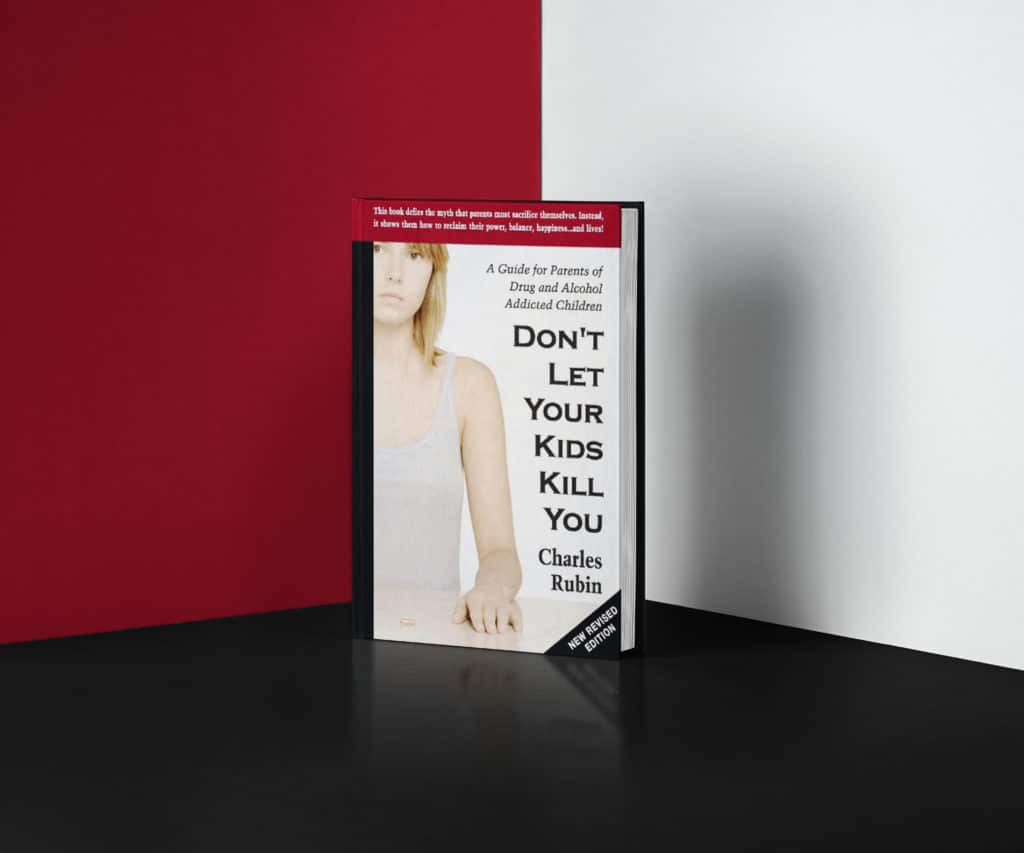
Don’t Let Your Kids Kill You by Charles Rubin is very relatable to intervention professionals who have difficulty helping parents focus on themselves and not their child’s substance use problem.
As with almost every family we encounter during the intervention process, they are confused and at odds. Many parents are headed for divorce and sleeping in separate beds due to letting their children divide them. I believe this book does a great job of helping the parents of children using drugs or alcohol understand that it is not OK not to light themselves on fire to keep their children warm.
I remember the first time I heard someone say that their church suggests God first, your spouse second, and your children third. As a parent myself, I remember thinking how foolish that sounded as I would die for my children, as most would. Today I get it, especially if the child is addicted to drugs or alcohol.
Even if God is not your thing, putting your spouse and yourself before your child’s addiction is highly recommended. When your child is ready for help, getting them help becomes a priority. Putting their addiction first and their spouse second often ends in turmoil, divorce, and the addiction problem becoming progressively worse.
You can’t make your child get clean and sober. When you put your child’s addiction first and enable them, you are making them worse along with yourself and everyone else around you. This is how unhealthy family systems form.
The primary enabler puts all their attention on the substance user, and all other relationships take a back seat. As resentments build, the family falls apart. While each family member blames the substance user, the real problem lies in the breakdown of the family. This begins when one of the parents chooses one child and their addiction over the other children or family members.
Recommended Books for Families of Alcoholics
Every book listed so far is a good read for a family of alcoholics. People often forget that alcohol is a drug and, in our opinion, the worst and most devastating one.
Alcoholics and their families often cringe and correct others if called an addict. It is as if the alcoholic and their family feel they are not as bad because they drink legal alcohol rather than consume illegal substances. The truth is alcoholics are addicts, and when you look at them side by side, the similarities are identical in behavior, perception, and destruction to an addict.
Any addict can read the book of Alcoholics Anonymous and find overwhelming similarities, as could an Alcoholic find overwhelming similarities in the book of Narcotics Anonymous. The drug of choice is not the problem, the substance user is the problem, and the substance that is used is their self-destructive solution of choice.
Whether it is a disease, past trauma, or repetitive use that led to a physical dependency, the drug of choice is the least relevant. In our decades of experience, it is without question that the worst cases we have ever had are due to alcohol.
Alcohol is more devastating than all the other illegal substances combined regarding one’s health and physical deterioration. Other drugs have their challenges, such as the overdose risks of opioids and the bizarre and insane behaviors resulting from stimulants or methamphetamine use.
We encourage the reader to stop looking at alcoholics differently and see the alcoholic as an addict. With that being said, any book on addiction, drugs, or alcohol can be helpful.
Codependent No More: How to Stop Controlling Others and Start Caring for Yourself
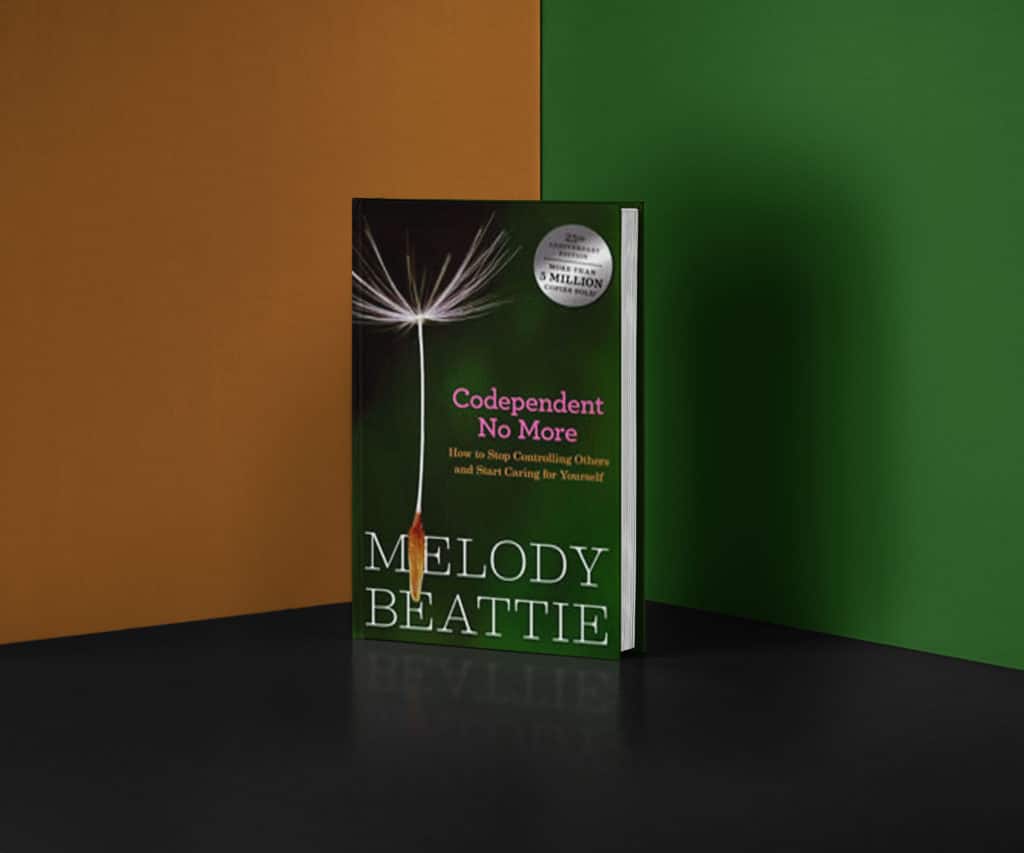
A quote you will see throughout our Family First Intervention website is, “An intervention is not about how to control the substance user; it is about how to let go of believing you can.”
For starters, nobody is reinventing the wheel in discussing or explaining boundaries. Most of the books are trying to make a similar point, and that is why it is helpful to read multiple books on boundaries so you can read them from various perspectives.
What is profound about Codependent No More by Melody Beattie is her ability to articulate the importance of boundaries while keeping the reader engaged. Her book has personal stories, reflections, quotes, self-tests, and exercises.
One of the many challenges we face as professionals are the family’s inability to let go and the overwhelming need to control the situation.
Many families do not see where or how they are controlling the situation. This control comes from maladaptive coping strategies intended to comfort themselves and not the substance user. The substance user benefits from the selfish acts of the family’s enabling and codependency.
The family’s true intentions of enabling are for themselves and not the substance user. It is very simple to see what enabling and codependency is doing for a substance user. It is far more difficult to see why the enabler is comforting the addict and what benefit it is providing the enabler.
Many family members try to control the situation for fear of the situation improving. They are afraid that if the substance user gets better, they will no longer be needed in the relationship, and they will no longer have a purpose.
Every unhealthy family member has adapted to the maladaptive ways of handling the situation, and it has become their new normal. The control of continuing the status quo is driven by the fear of letting go of the maladaptive coping skills and thoughts that are now part of the unhealthy family system.
For many, the fear of change is greater than staying the same. Families continue to control the situation instead of facing the fear of the change that will come if they stop.
Recommended Books for Explaining Addiction to a Child
Before we get into books for children that explain addiction, two groups are highly recommended for young people who have a parent or loved one who has an addiction.
The first is Alateen. Alateen is part of Al-Anon and focuses on young people who need help affected by addiction. Addiction can profoundly affect children, and the quicker they get into Alateen and individual therapy, the greater the opportunity for them to understand what is going on with themselves and the substance user.
The other group is ACOA, which stands for Adult Children of Alcoholics and Dysfunctional Families. As we stated above, alcoholics are addicts, and their drug of choice is alcohol. ACOA is a program for children raised in dysfunctional homes primarily due to alcohol and drug use, although they address other concerns relating to abuse, trauma, neglect, etc. ACOA is a 12-step group, and members of ACOA will be around others who can relate and who have gone through similar experiences.
For any child or adult who has experienced trauma, abuse, neglect, and substance use during childhood, ACOA can be a tremendous resource.
In addition to ACOA and Alateen, here are some book suggestions for young people and adults who can benefit from reading.
The Laundry List: The ACOA Experience
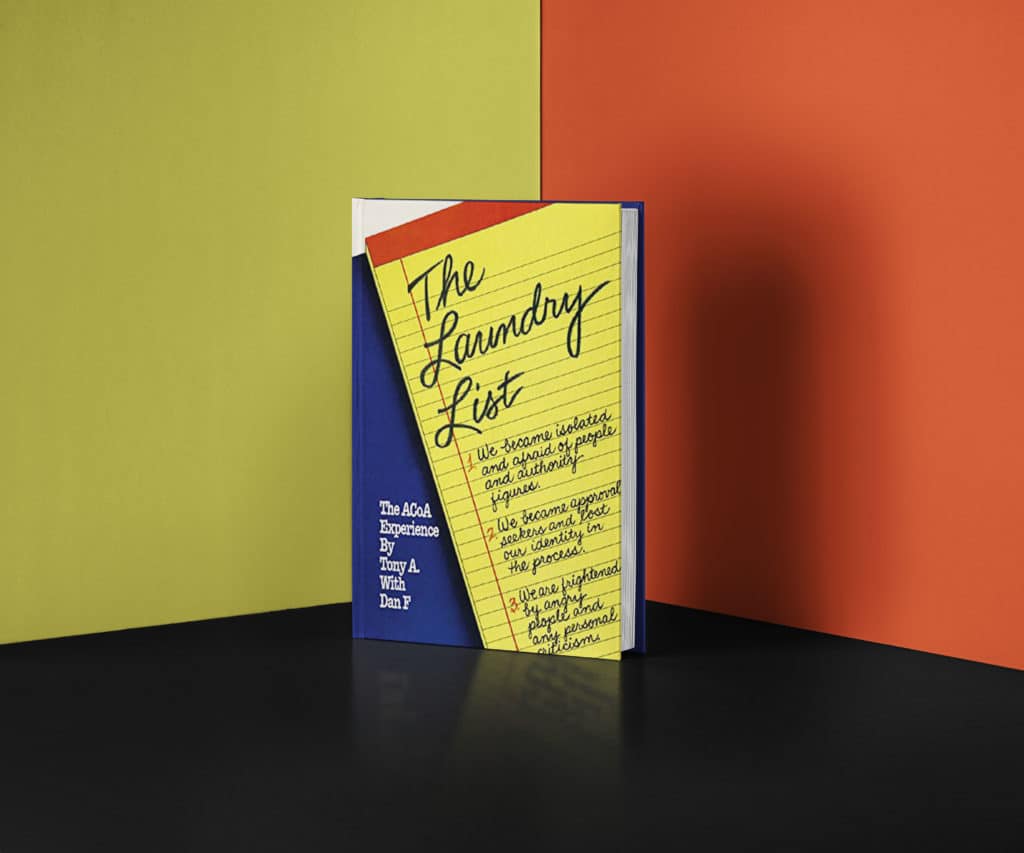
The Laundry List by Tony A. with Dan F. provides insight and meaning to the adult child of an alcoholic and addict. Tony is the Co-Founder of ACOA and provides insight into a child’s struggles while raised in a dysfunctional home.
The book’s authors do a great job of helping the reader understand how their experiences have profoundly impacted the affected person’s relationships with others.
When a child does not feel love, attention, and affection, they can trust and form healthy relationships and bonds later in life. Many who have suffered this emotional abuse believe that if their own family did not love them or care, how could anyone else?
Later in life, the affected person goes into relationships with escape hatches. In other words, they never let another person get close to them for fear of rejection later. They always seem to have to control the relationship by holding off saying I love you or fully trusting the other person.
Children of substance users and many substance users often act this way toward relationships with others. This is why we can’t stress enough that if a family doesn’t want to intervene with the substance user at least intervene in an attempt to help the substance user’s children.
Emmy’s Question
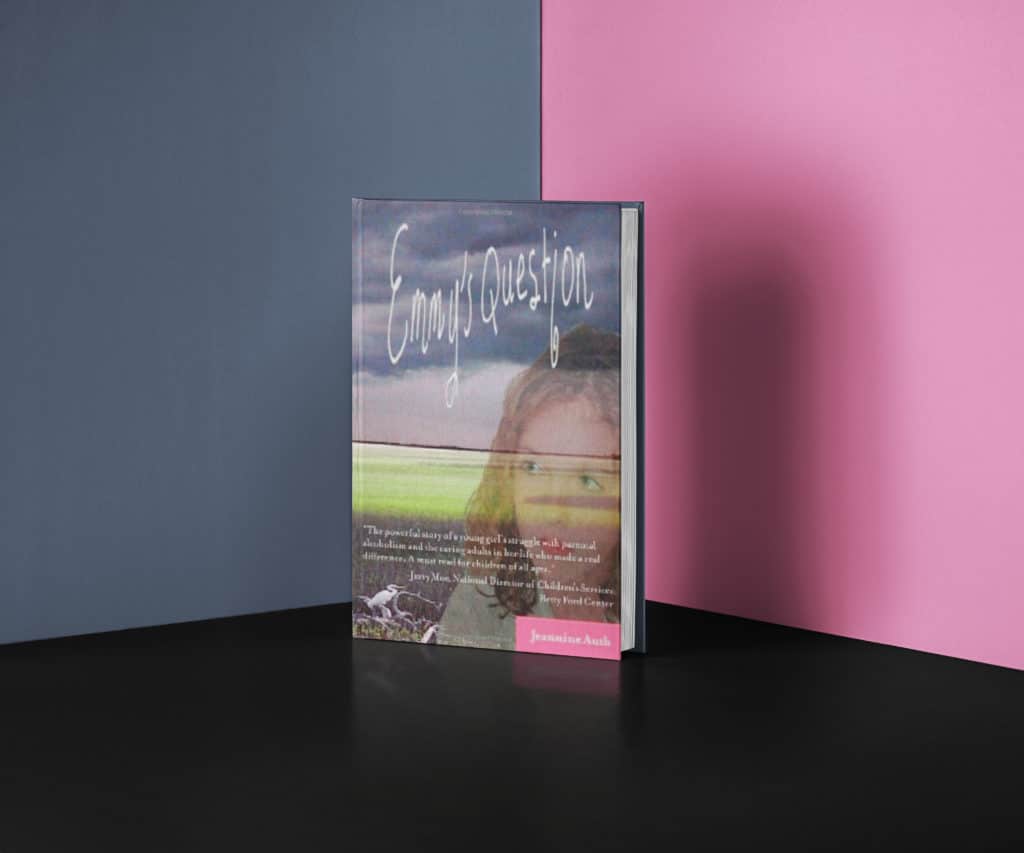
The book Emmy’s Question, written by Jeanine Auth, is about Emmy wanting an answer to why her mom chose alcohol over her. At the risk of spoiling the answer to those who have not read the book, we will just say it is a must-read for children and adults of alcoholic and drug-addicted parents.
The pain you feel from Emmy keeping mom’s alcoholism a secret is overwhelming. Any family reading this article and who reads this book will probably think twice about waiting another day to intervene in their loved one’s addiction when the addicted person has children who are being affected.
We can not stress enough the importance of doing something when children are being affected. As we said above, if you don’t want to help yourself or the substance user, that is on you. When children are involved, we feel it is child abuse and neglect not to take immediate action.
We take the stance that not only should the substance user lose their children who are actively addicted, but we also believe families should be equally charged if they knew what was going on and did not do anything to stop it. Professional addiction specialists have mandated reporters, and if we see something, we will say something, especially when we know you won’t.
My Dad Loves Me, My Dad Has a Disease
Dr. Claudia Black does a fantastic job of reaching children with her book. Written for children between the ages of 5-12, Dr.
Black reaches children with exercises that allow them to express their feelings. Children are greatly affected, and Dr. Black understands the impact of them holding their true feelings inside and not talking about their feelings. If you know a child that could benefit from this book, we highly recommend that you have them go through it.
Resentments mean to re-feel something. As you re-feel the event, you become angrier with every passing thought.
When a child cannot discuss what is going on at home, it has a profuse effect on their brain development and ability to form healthy relationships and bonds.
The resentments that develop in young children can lead them to substance use and unhealthy choices in relationships. The sooner you can get in front of a child affected by substance use, the less damage may be done.
Is It Time for an Intervention?
Chances are, if you’re reading this article, it is time for an intervention.
Families often wait for that perfect time to intervene. Once it has come to a point where you are thinking about it, you have gone past the ability to correct the problem with preventative measures.
Substance users and their families will always have an intervention by society, and they have no control over the timing of this. Something will intervene in their path. Whether it is health, marital, or legal concerns, an intervention will always occur.
The question is, why are you waiting for the substance user to get to the bottom and want help when the family is already there? Waiting for the substance user leads to inaction, usually resulting in interventions more likely to punish them than help them recover.
When your loved one is using substances and you are exhausted, it is time for an intervention. Families need not assume what an intervention is. It is not what you see on T.V., and it is not an aggressive approach like you see on sitcoms. Interventions are designed to help the family set boundaries and for the substance user to take accountability for their actions.
Please call us so we can hear your story. We would like to see how we can help answer your unanswered questions and debunk the myths associated with intervention and addiction.
We believe one of the best books to provide insight into the family system that works against a solution to addiction is the S.A.F.E.® Intervention & Family Recovery Coaching guide. Developed by Family First Intervention, S.A.F.E.® is the acronym for Self Awareness & Family Education. The book is about addictive behaviors, manipulations, and unhealthy family roles that develop to balance dysfunction. We hope that the reader will see things differently and apply the suggested solutions to help improve the situation.
An intervention is not about how to control the substance user; it is about how to let go of believing you can.
“The most formidable challenge we professionals face is families not accepting our suggested solutions. Rather, they only hear us challenging theirs. Interventions are as much about families letting go of old ideas as they are about being open to new ones. Before a family can do something about the problem, they must stop allowing the problem to persist. These same thoughts and principles apply to your loved one in need of help.”
Mike Loverde, MHS, CIP



